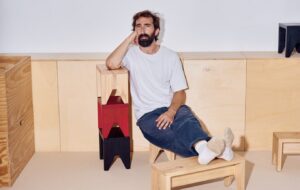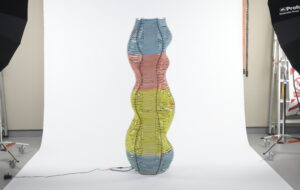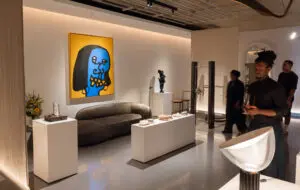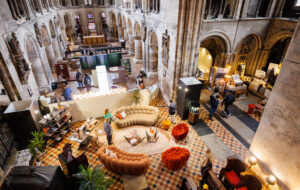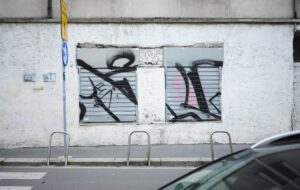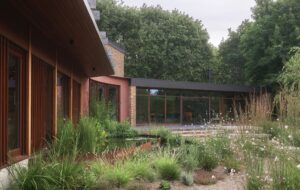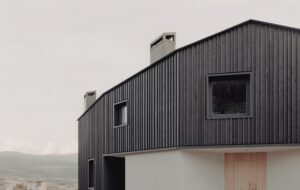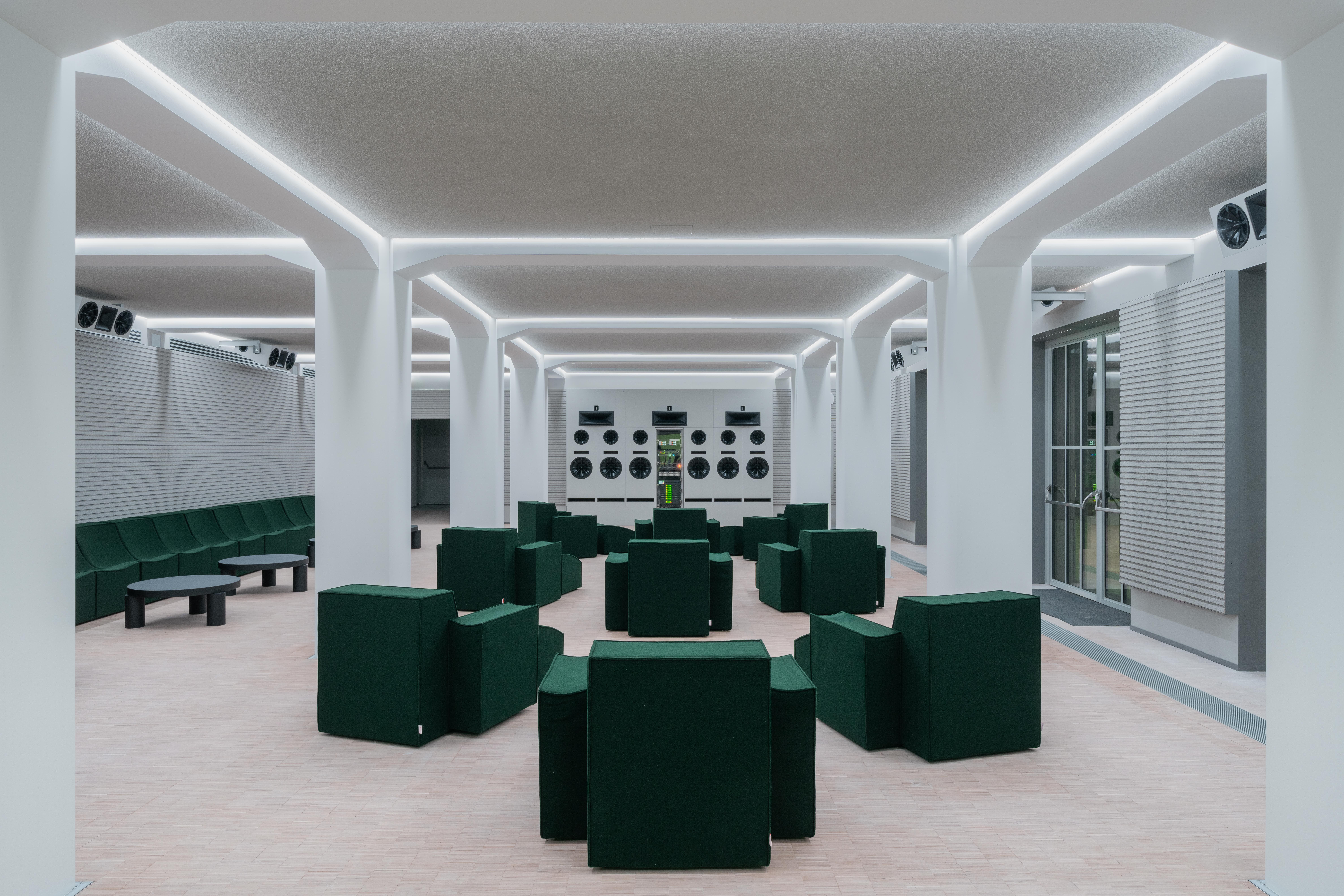
words Elaine Knutt
The ICA is assembling a global network of urban creative types – not just to swap business cards, but to change the world as we know it.
There’s a global cultural experiment in progress at the Institute of Contemporary Arts in London. Not in the public events and exhibition programme on the ground floor, but in the dimly lit private upper floor.
Taking place, a meeting of The Club, an invitation-only forum for “creative entrepreneurs”. They’re the people who fill the broadsheet arts pages on a Sunday, then pick up a Queen’s Award for Export on a Monday. Fashion designers Jessica Ogden and Shelley Fox, product designer Sam Buxton and Daljit Singh of new media design company Digit are among the 300 or so designers, architects and artists on the membership list.
Tonight, The Club is hosting the home match of one of its overseas fixtures. Creative businesses from Belgrade, including a fashion designer, a film production company, and a music festival promoter, hold presentations. Afterwards, there’s drinks and mingling. Business cards are shuffled; email addresses swapped. It’s classic networking, about as experimental as the Old Boys’ network.
But The Club operates at the intersection of creativity and commerce. “One of the first words used about the ICA was a ‘laboratory’, and The Club is part of that thinking,” says ICA director Philip Dodd, who has the lean, hungry looks of a man consumed by ideas. “The ICA was born to support creative people. In Britain, that has been historically narrowed to a small group of publicly funded people we call artists. But this is the ICA supporting contemporary creativity and talent wherever
it finds it.”
The Club primarily exists to put creative entrepreneurs in touch with each other and potential business partners. But since it was set up in 2000, The Club’s support structure has expanded to include seminars, talks and panel discussions, such as the St Luke’s ad agency on “surviving success, surviving failure”, or a session on film funding. The Club relies on support from the Arts Council, the National Endowment for Science, Technology & the Arts, the London Institute, Channel 4 and Cap Gemini, a public-private mix which reflects its ideas on blurring public subsidy and private sponsorship.
To challenge what Dodd calls “London’s profound insularity”, there’s also an overseas outreach programme. Club members visit major world cities, and plug into the local creative networks, recharge, and bring back some of their energy to London. Trips so far have included Moscow, Shanghai, Beijing and Hong Kong, with Amsterdam confirmed for 2004 and Delhi on the wish-list. As with Belgrade, the ICA also organises return visits for local creatives to meet members of The Club in London.
But everyone knows that arts and commerce are cosying up: Egg at the Tate, Orange at the London Film Festival. So what is the ICA’s experiment about?
Dodd talks about taking the elastic definition of culture that he has championed downstairs, and letting it breathe a more commercial atmosphere upstairs. “You have to remember that in the Fifties [Eduardo] Paolozzi made wallpaper for Heal’s,” he argues. Rather than leave our product designers, fashion designers and digital artists shivering on the margins of public subsidy, they need to be brought into the warm glow of the market. The Club is the controlled environment where the two sectors can meet.
But there’s also Dodd-the-social-revolutionary who wants to “re-imagine” the 21st century as a place where creativity is the new face of capitalism. It’s a seductive argument. Creative industries will be like mills to Manchester, steel to Sheffield. They’ll energise education and reach out from their studios to regenerate inner-city areas. They’ll also give more people the chance to work with their ideas and talents instead of their accountancy qualification.
Here, the argument intersects with a fashionable US theory – and the mantra of just about every UK city council – about the importance of creative economies to thriving cities. In The Rise of the Creative Class, the economist Richard Florida argues that successful cities need a strong creative class to innovate new business ideas, and generate a buzz and café culture that attracts people to work and stay.
Club members are a bit more pragmatic about the ICA experiment, stressing the importance of the business connections. Daljit Singh of Digit believes that the venue is crucial to The Club’s success. “Originating from the ICA makes The Club unique. It shakes you out of your context, and that’s really important. When you’re in the context of contemporary art, you’re desensitised, you take away the labels of designer or fashion person or architect.”
And that makes it easier for creative sparks to cross from one discipline to another. “I’ve met architects, product designers, graphic artists. No other organisation provides access to networking opportunities like that,” says Nick Farnhill, managing director of design consultancy Poke.
Dodd is an academic, writer and cultural commentator, who was appointed director of the ICA in 1997. In one sense, he has marched in tune with New Labour, courting commerce to the ICA – such as the Beck’s Futures prize – just as Blair courted the City. But Dodd believes creativity can refresh the economy and society in a way that corporate globalisation and neo-socialism no longer can. He cultivates the revolutionary’s air of not fitting in and is not just unshaven but unevenly so. During our interview, he stares into the middle distance, and uses eye contact like a weapon.
Some people react accordingly. “His style can be quite autocratic,” says one Club member. “He’s slightly overbearing; he tends to bulldoze stuff through.” But Tom Barker, of multi-disciplinary practice b-consultants, says: “He’s got an interesting approach – he’s happy to do things without a clear objective. These days, when everything is so task-based and all about outputs, it’s good to have a breathing space where it’s not clear what the outcome is.”
For Dodd, The Club is emphatically not just about making money. “There was a time when venture capitalists were knocking at the door of The Club, but on the whole we kept them out. The smell of money sends some people mad.”
Dodd’s vision of the New Economy has old sources. Creative networks work best in cities, he argues, where there is a critical mass of like-minded people. “Metropolitan cities have got more in common with each other than they have with their hinterland.” Therefore, creative networks between cities can reach across political anachronisms like national boundaries. “My wager [for the 21st century] is the city is the model, not the nation. We’re going back to 14th-century Florence.”
The Club’s cultural exchange programme is about building a trans-national network of creativity and commerce, without national embassies or export policies getting in the way. As fashion designer Shelley Fox says: “When you say Russia or the UK, it sounds parochial. When you say London or Moscow, you think international. And people do experience things differently when they’re living side by side. There’s a flexibility about cities that doesn’t spread around the country.”
Bypassing the embassies and the British Council also seems to get results. Serbian broadcaster B92 sharpened its teeth against Milosevic’s regime, but is now finding it’s tough to cut it against state-sponsored stations. Through The Club, Srdjan Andjelic met Peter Dale, head of documentaries at Channel 4. “Like Channel 4, we have similar problems – we have no state budget,” says Andjelic. One topic was improving ratings. “In Serbia, when you make TV documentaries, you have low ratings. He told us, you can make better ratings by entertaining people, by being smart.” In a fine example of cross-cultural exchange, Dale presented Andjelic with a sample video of Wife Swap.
It’s easy to be cynical about The Club, to point out that it is a grandiose vision attached to a networking forum with a few seminars and trips thrown in. But members themselves aren’t cynical, and genuinely get a buzz out of seeing creative sparks ignite in other disciplines and other countries. The fact is, The Club is a simple idea that just needed someone to have it. And therein lies Dodd’s real revolution.

